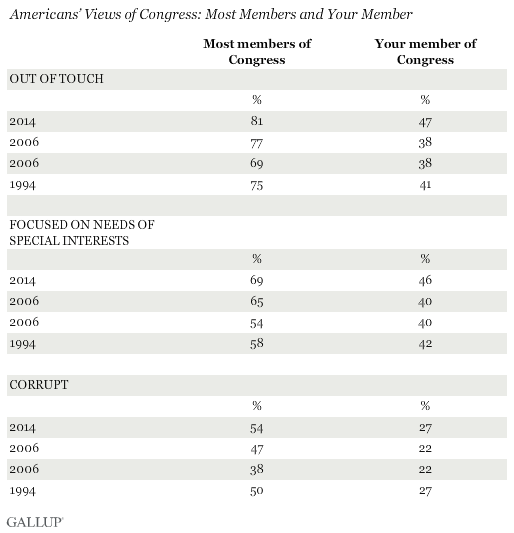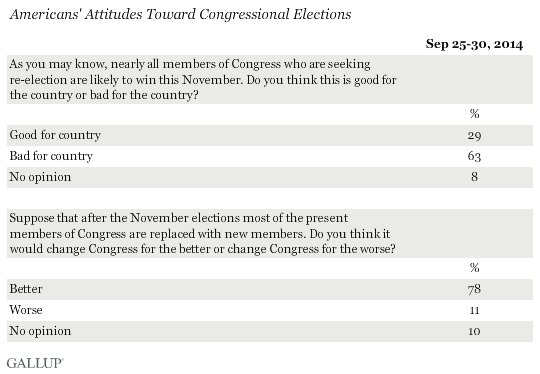PRINCETON, NJ -- In the U.S., the majority believes that most members of Congress are out of touch with average Americans, more focused on special interests than the needs of their constituents, and are corrupt. Americans are slightly more likely to say each of these things than they were in the past. At the same time, they are much less likely to say these descriptions fit their local member of Congress than to say they fit most members.

Gallup first asked these questions in 1994, re-asked them twice in 2006, and then asked again this year in a survey conducted Sept. 25-30.
A substantial majority of Americans have said that most members of Congress are out of touch and beholden to special interests each time Gallup has asked the questions. This year marks the second time that half or more of Americans agree that most members of Congress are corrupt.
Taken together, these responses add to the list of findings underscoring Americans' lack of confidence in Congress as a body, including low overall approval ratings, low trust in the legislative branch of government, and a confidence rating for Congress at the bottom of the list of American institutions.
Americans' cynicism about their own member of Congress is slightly higher than in the past. For the first time, more Americans say their member is focused on the need of special interests than on the needs of his or her constituents.
Additionally, Americans are now equally divided on whether their own member is out of touch with average Americans, and the 27% who say their member is corrupt ties the percentage from 1994.
Americans Typically More Positive About Their Own Member of Congress
The fact that Americans are more negative about most members of Congress than they are about their local member reflects an established pattern in which Americans' assessments of many entities and situations becomes more positive the closer they are to home. These include healthcare, schools, and crime. This pattern helps explain a central paradox in American politics: Although the public is extremely negative about Congress as an institution and has little confidence in its ability to get things done, Americans still send the vast majority of members of Congress who seek re-election back to Washington.
This disjuncture between Americans' views of most members and their own member of Congress is underscored by the finding in the Sept. 25-30 survey that 54% of Americans say they approve of the job their local member is doing. Gallup's September job approval rating for Congress as a whole was 14%.
Despite Americans' relatively high approval rating for their own member of Congress, 63% of Americans say it is bad for the country that nearly all members of Congress seeking re-election are likely to win in November. In addition, 78% of Americans say it would change Congress for the better if the present members of Congress are replaced with new members after the November elections.

In other words, while the majority of Americans approve of the job their member is doing, and thus would presumably vote for this person's re-election, an even greater percentage say it is a bad thing that most members of Congress will be re-elected.
Implications
Americans remain negative about most members of Congress, with majorities perceiving that members are out of touch with their local constituents and that they pay too much attention to special interests. A majority says that most members are corrupt.
Given that Congress consists of members elected from districts across the U.S., the only real action Americans can take to change the makeup of Congress is to vote against their incumbent. But Americans are much less likely to have harsh views of their own local member of Congress than they do of Congress as a whole. Even if Americans in some abstract way believe that their member is contributing to the partisan gridlock that frustrates Americans so much, they might approve of their member for the things he or she does to help the district, his or her party affiliation, or for being their official voice in Washington.
Furthermore, the majority of Americans might believe that their member is above average or the exception. Or, it could be that the average American perceives that systems and procedures in Washington need to be changed in fundamental ways that transcend the particular group of people who are elected to serve in Congress at any given time.
All in all, Americans' relatively positive attitudes about their local representatives, spread out across 435 congressional elections, help explain why so many members of Congress return to Washington year after year -- even while these same Americans so negatively assail the institution to which these members belong.
Survey Methods
Results for this Gallup poll are based on telephone interviews conducted Sept. 25-30, 2014, with a random sample of 1,252 adults, aged 18 and older, living in all 50 U.S. states and the District of Columbia.
For results based on the total sample of national adults, the margin of sampling error is ±4 percentage points at the 95% confidence level.
Interviews are conducted with respondents on landline telephones and cellular phones, with interviews conducted in Spanish for respondents who are primarily Spanish-speaking. Each sample of national adults includes a minimum quota of 50% cellphone respondents and 50% landline respondents, with additional minimum quotas by time zone within region. Landline and cellular telephone numbers are selected using random-digit-dial methods. Landline respondents are chosen at random within each household on the basis of which member had the most recent birthday.
Samples are weighted to correct for unequal selection probability, nonresponse, and double coverage of landline and cell users in the two sampling frames. They are also weighted to match the national demographics of gender, age, race, Hispanic ethnicity, education, region, population density, and phone status (cellphone only/landline only/both, and cellphone mostly). Demographic weighting targets are based on the most recent Current Population Survey figures for the aged 18 and older U.S. population. Phone status targets are based on the most recent National Health Interview Survey. Population density targets are based on the most recent U.S. census. All reported margins of sampling error include the computed design effects for weighting.
In addition to sampling error, question wording and practical difficulties in conducting surveys can introduce error or bias into the findings of public opinion polls.
View survey methodology, complete question results, and trends.
For more details on Gallup's polling methodology, visit www.gallup.com.

